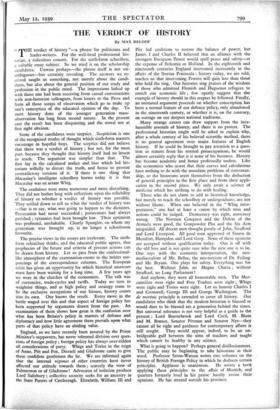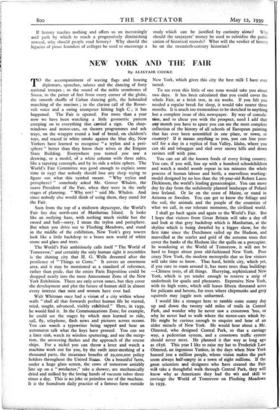THE VERDICT OF HISTORY
By MAX BELOFF
THE verdict of history "—a phrase for politicians and leader-writers. For the well-bred professional his- torian, a ridiculous conceit. For the sixth-form schoolboy, a suitable essay subject. So we tried it on the scholarship candidates. Unwise perhaps—the phrase itself is not un- ambiguotis—but certainly revealing. The answers we re- ceived taught us something, not merely about the candi- dates, but also about the general position of our study and profession in the public mind. The impressions linked up with those one had been receiving from casual conversations with non-historian colleagues, from letters to the Press and from all those scraps of observation which go to make up one's conception of the educated opinion of the day. To most history dons of the younger generation mass- observation has long been second nature. In the present case the result has been disquieting and the moral not at first sight obvious.
Some of the candidates were sceptics. Scepticism is one of the recognised modes of thought which sixth-form masters encourage in hopeful boys. The sceptics did not believe that there was a verdict of history ; but not, for the most part, because they thought that history itself had no lesson to teach. The argument was simpler than that. The flaw lay in the calculated malice and bias which led his- torians wilfully to distort the truth, and hence to present contradictory versions of it. If there is one thing that Macaulay's intelligent schoolboy knows today it is that Macaulay was an arrant Whig.
The credulous were more numerous and more disturbing. They did not bother long with reflections upon the reliability of history or whether a verdict of history was possible. They settled down to tell us what the verdict of history was —that is to say, what was going to happen to the dictators. Persecution had never succeeded ; persecutors had always perished ; tyrannies had been brought low. Their optimism was profound, unshakable. Clearly Spengler, on whom my generation was brought up, is no longer a schoolroom favourite.
The precise views in the essays are irrelevant. The sixth- form schoolboy thinks, and the educated public agrees, that prophecies of the future and criteria of present actions can be drawn from history. Let us pass from the confessional- like atmosphere of the examination-rooms to the bolder out- pourings of the correspondence columns. The European crisis has given an opportunity for which historical amateurs must have been waiting for a long time. A few years ago we were in the clutches of the economists. The talk was of currencies, trade-cycles and tariffs. Today we turn to weightier things, and as high policy and strategy come to be the exclusive occupations of our leisure, history comes into its own. One knows the result. Every move in the battle waged over this and that aspect of foreign policy has been supported by arguments drawn from the past. An examination of them shows how great is the confusion over what has been Britain's policy in matters of defence and diplomacy and how little agreement there prevails upon what parts of that policy have an abiding value.
England, so we have recently been assured by the Prime Minister's supporters, has never tolerated division over ques- tions of foreign policy ; foreign policy has always over-ridden all considerations of party. Whigs and Tories in the reign of Anne, Pitt and Fox, Disraeli and Gladstone unite to give these confident gentlemen the lie. We are informed again that the internal regimes of other countries have never affected our attitude towards them ; scarcely the view of Palmerston or of Gladstone! Advocates of isolation produce Lord Salisbury; collective security seeks for an ancestry in the State Papers of Castlereagh. Elizabeth, William III and Pitt led coalitions to restore the balance of power, but James I and Charles II believed that an alliance with the strongest European Power would spell peace and safety—at the expense of Bohemia or Holland. In the eighteenth and nineteenth centuries England intervened incessantly in the affairs of the Iberian Peninsula ; history today, we are told, teaches us that intervening Powers will gain less than those who held the ring. Our histories sing praises of the wisdom of those who admitted Flemish and Huguenot refugees to enrich our economic life ; few openly suggest that the example of history should in this respect be followed. Finally, an animated argument proceeds on whether conscription has been a normal feature of our defence policy, only abandoned in the nineteenth century, or whether it is, on the contrary, an outrage on our deepest national traditions.
Many strange causes can draw support from the inex- haustible arsenals of history, and there is no protest. The professional historian might well be asked to explain why, after a whole century of his beloved scientific method, there is no general agreement over major features of English history. If he could be brought to pay attention to a ques- tion so remote from his normal preoccupations, he would almost certainly reply that it is none of his business. History has become academic and hence professedly useless. Like the economists who assert that their curves and calculations have nothing to do with the mundane problems of statesman- ship, so the historians avert themselves from the deduction of general principles in the first place and from their appli- cation in the second place. We only await a science of medicine which has nothing to do with healing.
Those who do not claim to add to historical knowledge, . but merely to teach the schoolboy or undergraduate, are not without blame. When one believed in the " Whig inter- pretation," one had at least a canon by which men and actions could be judged. Democracy was right, autocracy wrong. The Norman Conquest and the Defeat of the Armada were good, the Gunpowder Plot and the Six Acts misguided. All decent men thought poorly of John, Strafford and Lord Liverpool. All good men approved of Simon de Montfort, Hampden and Lord Grey. None of these opinions are accepted without qualification today. One is off with the old love and is not quite sure who the new one is to be. One toys with the economic interpretation, the neo- mediaevalism of Mr. Belloc, the neo-toryism of Dr. Felling and Mr. Bryant. One plays for safety. Everything was for the best. Without John, no Magna Charta ; without Strafford, no Long Parliament!
And anyhow, they were all honourable men. The Mer- cantilists were right and Free Traders were right ; Whigs were tight and Tories were right. Let us honour Charles I and Cromwell, George III and George Washington. The de mortuis principle is extended to cover all history. Our candidates who think that the modern historian is biassed or would dare to be biassed are a generation behind the times. But universal tolerance is not very helpful as a guide to the present ; Lord Beaverbrook and Lord Cecil, M. Blum and M. Bonnet, Senator Pittman and Senator Nye—they cannot all be right and guidance for contemporary affairs is still sought. They would appear, indeed, to be an un- bridgeable gulf between the aims of teachers and taught which cannot be healthy in any science.
What is going to happen? Perhaps general disillusionment. The public may be beginning to take historians at their word. Professor Seton-Watson writes two volumes on the history of British Foreign Policy in which he deduces certain principles. Applause is unanimous. He writes a book applying these principles to the affair of Munich, and quarters formerly loud in his praise hastily revise their opinions. He has strayed outside his province. If history teaches nothing and offers us an increasingly arid path by which to reach a progressively diminishing reward, why should people read history? Why should the legacies of pious founders of colleges be used to encourage a study which can be justified by curiosity alone? Why should the taxpayers' money be used to subsidise the publi- cation of historical records? What will the verdict of history be on the twentieth-century historian?



















































 Previous page
Previous page